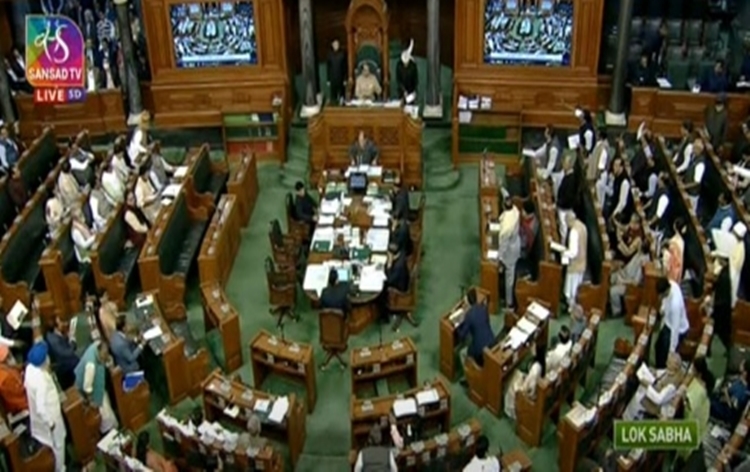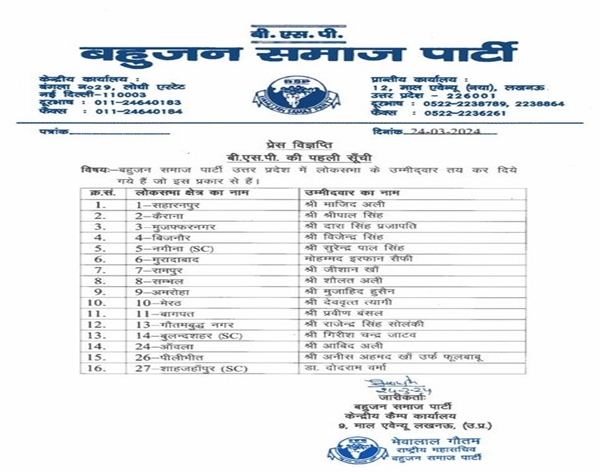The Digital Personal Data Protection Bill, which seeks to protect the privacy of Indian citizens while proposing a penalty of up to 250 crore rupees on entities for misusing or failing to protect the digital data of individuals, was today cleared by Lok Sabha by a voice vote amid slogan shouting by opposition members over the Manipur issue.
Some amendments moved by opposition members seeking changes in the Bill were defeated by voice vote.
The Bill which comes after six years of the Supreme Court declaring "Right to Privacy" as a fundamental right has provisions to curb the misuse of individuals' data by online platforms.
Moving the Bill for consideration and passage, Information Technology Minister Ashwini Vaishnaw said, "It would have been good had the opposition discussed the Bill today. But no opposition leader or member is concerned over the rights of the citizens." He said the Bill has been brought after extensive public consultation.
Referring to the salient features of the Bill, the minister said its language is very simple so that even a common person can understand it.
Referring to certain principles on which the Bill is based, Vaishnaw said that according to the principle of legality, data of a person has to be taken based on prevailing laws.
He also said as per the principle of purpose limitation, data should be used for the purpose it was taken for.
Why should more data be taken than required, the minister told members referring to the principle of data minimisation.
He also noted that there has to be a storage limitation as far as the data of individuals is concerned. "Data should not be kept beyond what it needs to be stored," the union minister said.
Notice and consent will be provided in all the 22 languages mentioned in the 8th Schedule so that it becomes easier for the people to comprehend.
Referring to the alternative dispute resolution mechanism put in place, he explained that if an organisation commits a mistake, it will go to the data protection board, rectifies mistake and pays penalty "and move ahead".
Responding to suggestions by members that the Right to Information provisions have been diluted in the bill, he said RTI and personal data protection have been harmonised. The Bill was later passed after a brief debate.
As part of the compliance framework, it envisages the setting up of a Data Protection Board of India to determine non-compliance with the provisions of the legislation, impose penalty for such non-compliance, and perform such other functions as the central government may assign to it under the provisions of the Bill or any law.
Earlier, the proceedings of the Lok Sabha were adjourned twice — first due to the protests by the opposition over the Manipur issue and for the second time when treasury and opposition benches engaged in sloganeering over a report on Chinese funds coming to India.
When the Lok Sabha resumed its business at 11 AM, the opposition members were on their feet and came to the well of the House protesting over the continuing violence in Manipur and demanding a statement of Prime Minister Narendra Modi on it.
A visibly disturbed Lok Sabha Speaker Om Birla asked the opposition MPs whether they were interested in taking part in the Question Hour which was the scheduled business.
As the opposition members continued their protests and sloganeering, the speaker adjourned the proceedings within minutes of its proceedings.
The Manipur violence has rocked proceedings in both the Houses since the Monsoon session began on July 20, with the opposition demanding a statement from Prime Minister Modi and a discussion on the situation in the North-Eastern State.
Defence Minister Rajnath Singh and Home Minister Amit Shah had said that the government was ready for a debate on the Manipur issue.
The speaker also had said that the opposition can't decide who would reply, on behalf of the government, to the debate.
The opposition subsequently moved a no-confidence motion against the Modi government, apparently aiming to force the prime minister to speak on the Manipur violence.
When the Lok Sabha met again at 12 noon, Nishikant Dubey of BJP, raised the issue of a news report in the New York Times which claimed that web portal NewsClick has received 38 crore Rupees funding and the money has been used to create an anti-India environment.
This led to sloganeering by treasury and opposition benches.
Dubey alleged that NewsClick is a member of anti-India 'Tukde Tukde' gang, and demanded that the Government investigate the beneficiaries of the fundings.
"… Between 2005 and 2014, the Chinese government has paid money to Congress…. Congress wants to divide India …," Dubey alleged amid the uproar.
As members from the opposition and treasury benches continued to be on their feet, Kirit Solanki, who was chairing the proceedings, adjourned the House till 2 PM.
Congress leader Rahul Gandhi, whose membership of the Lower House was restored in the morning in the wake of the Supreme Court staying his conviction in a defamation case, was present in the House when Dubey raised the issue.
The Lok Sabha also passed the Anusandhan National Research Foundation Bill to set up a national agency to fund research across universities in the country.
Science and Technology Minister Jitendra Singh had introduced the Anusandhan National Research Foundation Bill-2023 on Friday in the Lower House.
The Bill seeks to set up a 50,000-crore rupees fund, with a sizeable contribution from the private sector by tapping into the corporate social responsibility (CSR) funds, to "seed, grow and promote" research and development (R&D) and foster a culture of research and innovation throughout India's universities, colleges, research institutions, and R&D laboratories.
"Prime Minister Narendra Modi has provided an enabling milieu due to which over the last nine years, many taboos of the past were broken, space was opened up for the private sector and that is why many startups are working with ISRO. It was our Chandrayan that brought pictures of water and today organisations like NASA are waiting for our findings for their research," Singh said.
The National Research Foundation (NRF) will be set up with a budget of about 50,000 crore rupees for a period of five years, with 10,000 crore rupees from the government, 4,000 crore rupees from the Science and Engineering Research Board and 26,000 crore rupees from places like the private sector, from philanthropists or other aid.
The minister said with the formation of NRF, India will join other countries in having such an organisation and expressed hope that it will soon surpass them.
Explaining the need for the bill, the minister said India's existing system had a missing link. He said that in the area of funding, mostly the centres and departments are in universities, but research is also done in science institutes and IITs. Singh noted that the funds are granted on the basis of competition and often the IITs would take away 65 per cent of the funds.
The minister said the bill seeks to set right the R&D funding which, presently, is "skewed in favour of IIT and other elite institutes".
He said the NRF is meant to ensure greater participation and that scientific research is funded equitably.
The Lok Sabha passed a bill allowing persons qualified or registered under the Jammu and Kashmir Pharmacy Act to be registered as pharmacists under the Pharmacy Act, thus doing away with the ambiguity with regard to the two legislations.
Piloting the Pharmacy (Amendment) Bill, 2023, Health Minister Mansukh Mandaviya said that changes will increase job opportunities for the youth of Jammu and Kashmir.
The Bill, which was passed by voice vote in the Lower House, seeks to do away with issues concerning the status of persons registered or qualified under the Jammu and Kashmir Pharmacy Act.
Under the current dispensation, registration under the Pharmacy Act is mandatory for persons practising pharmacy in the country.
Replying to the short debate on the Bill, Mandaviya said the situation in Jammu and Kashmir has changed significantly after the abrogation of Article 370 and the amendments to the Pharmacy Act will enable the youth to take up even government jobs.
The Minister further said that the government's Production Linked Incentive (PLI) scheme is transforming the healthcare sector in the country with domestic industry taking up production of critical medicine and reducing dependence on imports.
He said that soon 38 out of 52 critical active pharmaceutical ingredients will be produced within the country.
Mandaviya said that Ayushman Bharat Scheme has ensured quality medical treatment even for poor people. Similarly, Jan Aushadhi Kendras are making generic medicines available to people at lower cost.
Lok Sabha passed a bill which will provide legal framework to mediation.
Law Minister Arjun Ram Meghwal said The Mediation Bill provides for "legal backbone" to mediation and reduce burden on courts.
It will also promote ease of doing business as many petty disputes would be cleared through this alternative dispute resolution mechanism, Meghwal said, adding, this will be a cost effective means of dispute resolution.
Replying to the debate on the bill, the legislation has provision for penal action if the parties fail to comply with the agreed mediation.
Meghwal said "Under this we are making the Mediation Council. This is a neutral third party. This bill makes the process a time-bound mechanism which saves time and money of parties."
He said, mediation is part of Indian culture and tradition but it lost its relevance during the British period.
The Bill was first introduced in Rajya Sabha in 2021 but referred to the parliamentary committee on law and personnel for detailed study of the Bill.
The Lok Sabha also passed The Coastal Aquaculture Authority (Amendment) Bill, 2023 which seeks to decriminalise the offences committed in carrying out the coastal aquaculture activities and ensure ease of doing business.
The Bill also seeks to expand the scope, remove regulatory gaps and reduce the regulatory compliance burden without diluting environmental protection rules in the coastal areas.
To decriminalise the offences, the legislation seeks to remove the jail term of up to three years and impose only a penalty of up to 1 lakh rupees.
News On AIR | August 7, 2023 9:39 PM | Review of Parliament proceedings in Lok Sabha
Review of Parliament proceedings in Lok Sabha















